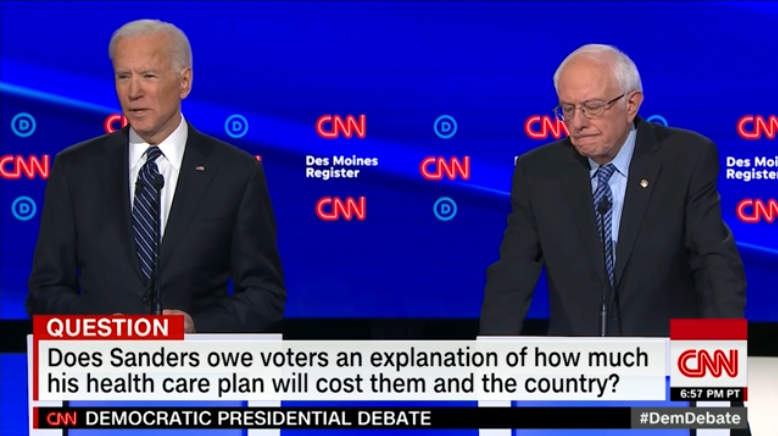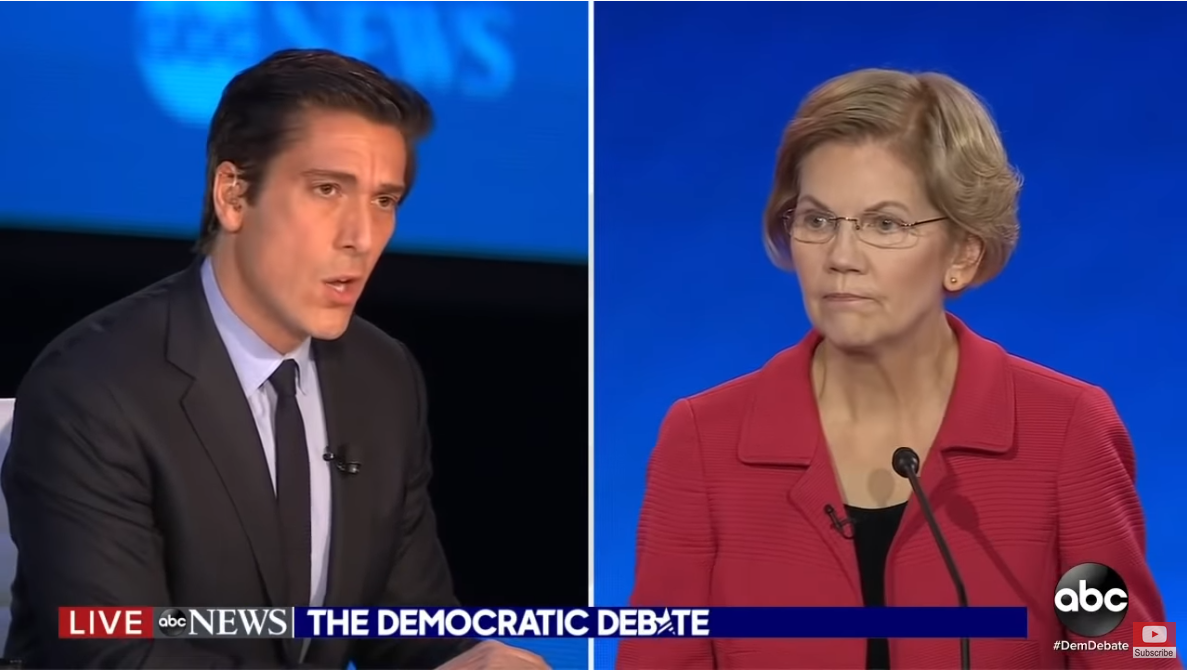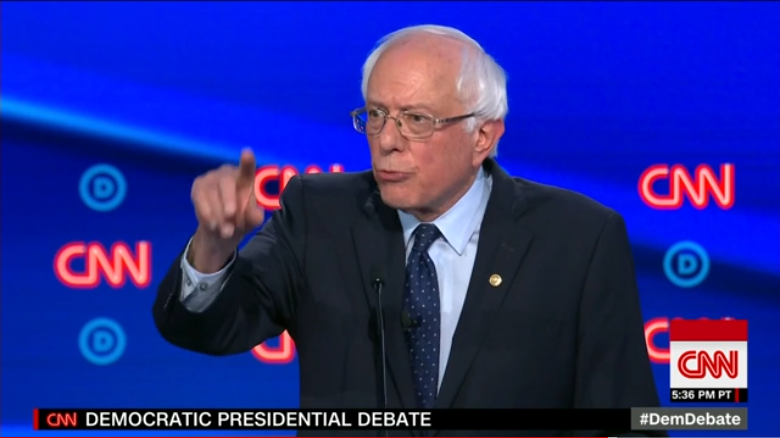Debate Moderators Frame Questions to Define Acceptable Politics
Julie Hollar

 With Super Tuesday around the corner, the Democratic presidential debates are coming to a close. The debates are ostensibly an exercise in democracy, a chance for voters to evaluate candidates' positions in order to cast a better informed vote in the nominating contest. But a review of three of the most frequent topics of debate starkly demonstrates how media hosts use their platform less to inform voters in an evenhanded way than to define which positions—and candidates—are acceptable, and which are not.
Healthcare

Both Bernie Sanders and other candidates were often asked how Sanders would pay for his healthcare plan (CNN, 1/14/20).
The moderators have asked more questions about healthcare (161) than any other issue. When Medicare for All has been raised (specifically named in 24 questions, plus many more followups), it has been overwhelmingly associated with negative impacts: "forcing" people off their private insurance ( 7/30/19), paying more in taxes, getting Donald Trump reelected (or "cost[ing] you critical votes"— 11/20/19), forcing people in the health insurance industry out of work. Sixteen of the 24 questions on Medicare for All had this kind of negative spin, while only one also mentioned a positive outcome: that insurance premiums and other costs would be eliminated. However, even that single question, asked of Elizabeth Warren by CNN's Jake Tapper ( 7/30/19), was framed to discount the benefit mentioned:
Senator Sanders has said that people in the middle class will pay more in taxes to help pay for Medicare for all, though that will be offset by the elimination of insurance premiums and other costs. Are you also, quote, "with Bernie" on Medicare for all when it comes to raising taxes on middle-class Americans to pay for it?
In contrast, all of the other candidate plans that stop short of Medicare for All—in other words, the plans of basically every candidate other than Bernie Sanders and Elizabeth Warren who lasted through enough debates to flesh out their healthcare plan—were associated with negative impacts a mere three times, and not once since the end of July. In the second debate ( 6/27/19), Michael Bennett was asked if his plan was "enough to get us to universal coverage"; and in the fourth debate ( 7/31/19), Joe Biden was asked to respond to Bill de Blasio's charge that "Democrats who wanted to keep the private insurance industry are defending a healthcare system that is not working," while Jay Inslee was questioned whether a public option that might only save families 5% was "really the kind of relief that the American people need." Most of the questions about non-Medicare for All plans were framed neutrally, typically either in the form of "What's your response?" or as when the New York Times' Marc Lacey asked Tom Steyer ( 10/15/19), "How would you address the opioid epidemic that exists here in Ohio and around the country?"
The skew can be further demonstrated by looking at the healthcare prompts given to Sanders (27), Warren (23) and Biden (22); aside from a brief early spike for Kamala Harris, these three led the polls for most of the debate season, and received the most questions on the topic.
Eleven of Warren's questions asked her to address criticisms or make clarifications about her plan; none asked her about flaws in her opponents' plans—unless you count the three times ( 7/30/19, 9/12/19, 10/15/19) she was asked whether she would follow Sanders' lead in being "candid about the fact that middle-class taxes are going to go up and most of private insurance is going to be eliminated." Of Sanders' questions, eight asked him to address criticisms or potential pitfalls of his plan; none asked him about flaws in his opponents' plans. (The rest of Sanders' and Warren's questions were primarily prompts to respond to another candidate's answer—e.g., "Senator Warren, your response?")
By contrast, Biden has gotten next to no scrutiny of his healthcare plan. In fact, he has received the same number of questions about the flaws of his opponents' plans as he has questions—seldom critical—about his own plan.
- "You were an architect — one of the architects of Obamacare. So where do we go from here?" (6/27/19)
- "So you said that [undocumented immigrants] would be covered under your plan, which is different than Obamacare. Can you explain that change?" (6/27/19)
- "Vice President Biden, you just heard Mayor de Blasio. He said in the past that Democrats who wanted to keep the private insurance industry are defending a healthcare system that is not working. What's your response?" (7/31/19)
Vs.:
- "Are Senators Warren and Sanders being realistic about the difficulty of enacting their plans?" (10/15/19)
- "You spent an awful lot of time 10 years ago trying to pass a bill far less ambitious than what Senator Sanders is talking about here. Is he being realistic?" (12/19/19)
- "Vice President Biden, does Sen. Sanders owe voters a price tag on his healthcare plan?" (1/14/20)
This comparison undercounts the nature of the skew against Medicare for All candidates, since several of the "your response" questions to Sanders came immediately after questions like the three above to Biden that named Sanders. And Biden wasn't the only one to receive questions about Sanders' healthcare plan; Pete Buttigieg, for example, was asked by ABC’s George Stephanopoulos in the February 10 debate, "Mayor Buttigieg, you just heard Senator Sanders make healthcare the center of his piece. Do you think his healthcare plan can bring people together?" In addition, nearly all of the questions to Sanders and Warren that asked them to defend their own plan followed up by giving other candidates a chance to respond—essentially, an invitation to attack.
Military Intervention
A similar skew against positions that challenge the political establishment was apparent in questions about military intervention. Of the questions on Afghanistan, seven exhibited a distinct bias toward intervention, while only two framed intervention as potentially negative. (The rest were neutral, either simply offering a candidate a response to another candidate, or asking for a clarification of a candidate's stance with no pro or con context—such as, "Will you withdraw all US servicemembers by the end of your first year in office?")

ABC's David Muir (2/7/20) pushes Elizabeth Warren to continue the 18-year-old war in Afghanistan.
Five of the pro-intervention questions came from ABC. For example, when Elizabeth Warren was asked by David Muir ( 9/12/19) whether she would "keep that promise to bring the troops home starting right now with no deal with the Taliban," and she answered in the affirmative, George Stephanopoulos badgered her further:
Top US leaders, military leaders on the ground in Afghanistan told me you can't do it without a deal with the Taliban. You just said you would, you would bring them home. What if they told you that? Would you listen to their advice?
(Clearly dissatisfied with her answer, Muir asked Warren a nearly identical version of that question in ABC's February 7 debate as well.)
The only place media seem to be able to find room for anti-interventionism is on the subject of the Iraq invasion, where four questions have been framed by the assumption that the invasion was a mistake—not a big surprise, given that the majority of the public and an overwhelming majority of Democrats take that position today. However, shift away from the decision to invade and the general bias toward endless war demonstrated in the Afghanistan questions returns, as when ABC's Muir asked Biden ( 9/12/19):
There was a major drawdown of US troops, and then ISIS seized, by some estimates, 40% of the territory in Iraq. You then had to send thousands of troops back in. Was it wrong to pull out of Iraq that quickly? And did the move actually help ISIS take hold?
Regarding Syria, too, arguments for intervention dominated the questions. When Trump announced a withdrawal of US troops from Syria in October, CNN’s Anderson Cooper asked Biden ( 10/15/19), "So would you send American troops back into northern Syria to prevent an ISIS resurgence and protect our Kurdish allies?" He then turned to Tulsi Gabbard, who had argued that US troops should leave Syria: "How would you have pulled out troops without the bloodshed we're seeing now?"
Later, when Syrian and Russian troops targeted civilians in Idlib, CBS’s Margaret Brennan asked Buttigieg ( 2/25/20), "The city of Idlib in Syria is facing an unprecedented humanitarian crisis. The Syrian regime and Russia are targeting schools, bakeries, and hospitals. What would you do as president to push back regime and Russian forces and stop the killing of innocent civilians?" She then turned to Warren: "What would Senator Warren do to stop the mass murder?"
While most agree that human rights atrocities merit some form of international response, Brennan's framing of "pushing back" military forces assumes that the only proper response must be military rather than diplomatic.
Questions about troops in the Middle East more generally likewise tilted toward intervention, with none pointing out the costs (in lives or money) of maintaining a US military presence, yet finding space to ask Warren how bringing home combat troops "protect[s] America's national security" ( 2/25/20), or pointing out to Sanders that "when American troops last left Iraq, ISIS emerged and spread terror across the Middle East and, indeed, around the world" ( 1/14/20).
Electability
A perennial favorite topic among journalists is the question of electability, and the debates proved no exception. As we have pointed out many times, it's an empirical question better left to voters and to head-to-head polls, but in the hands (and mouths) of journalists it becomes instead a tool to push Democratic candidates to the center ( FAIR.org, 10/25/19, 2/11/20). In the debates, candidates were roped into conversations about electability 80 times by our count—but in a far from evenhanded way.
Moderators raised the issue of Sanders' electability three times as often as that of any other candidate. Twenty-one questions—to Sanders and to his opponents—directly addressed Sanders' electability, and at least a dozen more were followups to these questions.

CNN (7/30/19) asked Bernie Sanders if he was "too extreme to beat President Trump."
Twenty of the 21 questions presented potential liabilities. The concerns included his age (along with Warren and Biden's— 10/15/19), his call for a political revolution ( 10/15/19), his "bullying" supporters ( 2/19/20), his ability to increase voter turnout ( 2/7/20), whether he is "polarizing" ( 2/19/20), whether he is "too extreme to beat President Trump" ( 7/30/19), whether Medicare for All is "political suicide that will just get President Trump re-elected" ( 7/30/19), and—clearly the media questioners' favorite concern—Sanders' relationship to the label "socialism" ( 7/30/19, 1/14/20, 2/7/20, 2/25/20).
One question presented Biden with a chance to challenge Sanders and Buttigieg’s success in Iowa ( 2/7/20):
In the last few days, you’ve been saying that Democrats will be taking too big a risk if they nominate Senator Sanders or Mayor Buttigieg, but they came out on top in Iowa. What risks did the Iowa Democrats miss?
By contrast, Biden, who has staked his campaign almost entirely on the idea that he is the most electable candidate, had that notion questioned only five times—two of which were scarcely challenges. One followed questions to Sanders, Amy Klobuchar and Warren about their own potential electability issues ( 1/14/20), and was therefore clearly intended to be a part of that discussion, though—unlike the questions to the other three—it presented no potential personal weakness for Biden to answer to:
Vice President Biden, the eventual nominee will face President Trump, who has no problem mocking people, using insulting nicknames, slinging mud and telling lies. The debate against him will make tonight's debate look like child's play. Are you prepared for that?
And in a question to Andrew Yang ( 7/31/19), Biden was framed as being the most electable:
Mr. Yang, in poll after poll democratic voters are saying that having a nominee who can beat President Trump is more important to them than having a nominee who agrees with them on major issues. And right now, according to polls, they say the candidate who has the best chance of doing that, of beating President Trump is Vice President Biden. Why are they wrong?
Though she backs a political agenda with many similarities to Sanders' and was his closest competitor in the polls for much of the campaign season, Warren had her electability scrutinized in only eight questions—once concerning her age ( 10/15/19), once concerning whether she was more electable than Bloomberg (2/10/20), three times concerning her policies being too far from the center ( 7/30/19, 10/15/19, 1/14/20), and three times (together with Klobuchar) when women's electability was brought up ( 1/14/20)—which were presented as much as a challenge to Sanders' credibility as to Warren and Klobuchar's electability ( FAIR.org, 1/15/20).
Aside from those three questions, Klobuchar got two softball electability prompts ( 7/30/19):
Senator Warren at the beginning of the night said that Democrats cannot bring — cannot win the White House with small ideas and spinelessness. In the last debate, she said the politicians who are not supporting Medicare for All simply lack the will to fight for it. You do not support Medicare for All. Is Senator Warren correct? Do you just not lack the will to fight for it?
Sen. Klobuchar, you're pitching yourself as a practical candidate who can get things done. And even tonight you've dismissed some of the ideas that are offered in this primary as pipe dreams. How are you going to inspire Democratic voters with a message of pragmatism?
Buttigieg's electability was raised four times (including the Iowa mention shared with Sanders) and Bloomberg's three (one with a positive framing).
It's a remarkable skew, which could only begin to be justifiable if Sanders showed tremendous weakness in polling against Trump. But he doesn't. Sanders has consistently topped Trump in head-to-head polls since the beginning of his campaign and is currently beating him by an average of 4.7 percentage points—as compared to 4.8 for Biden, 4.0 for Bloomberg, 2.0 for Warren and Buttigieg and 1.6 for Klobuchar.
But that political reality—like the reality of Medicare for All's popularity, and the unpopularity of the country's "forever wars"—is distinctly unfavored in the media. Hence the incentive for corporate media to use their control of debate questions to try to reshape those realities.
Featured image: Moderators at the February 25, 2020, debate, CBS's Norah O’Donnell and Gayle King.
|






 he president opened his response to a looming pandemic with
he president opened his response to a looming pandemic with 





